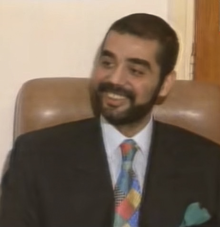
Back عدي صدام حسين Arabic عدى صدام حسين ARZ Udey Hüseyn Azerbaijani Удэй Хусейн Byelorussian عودەی سەددام حوسێن CKB Udaj Husajn Czech Uday Hussein Danish Udai Hussein German Ουντάι Χουσεΐν Greek Uday Huseín Spanish
Uday Saddam Hussein | |
|---|---|
عدي صدام حسين | |
 Hussein in 1997 | |
| Member of the National Assembly | |
| In office 27 March 2000 – 9 April 2003 | |
| Constituency | Baghdad |
| Commander of the Fedayeen Saddam | |
| In office 1995 – 12 December 1996 | |
| President | Saddam Hussein |
| Preceded by | Position established |
| Succeeded by | Qusay Hussein |
| Personal details | |
| Born | Uday Saddam Hussein al-Nasiri al-Tikriti 18 June 1964 Baghdad, Iraq |
| Died | 22 July 2003 (aged 39) Mosul, Iraq |
| Cause of death | Ballistic trauma |
| Resting place | Tikrit, Iraq |
| Political party | Arab Socialist Ba'ath Party |
| Parent(s) | Saddam (deceased) Sajida |
| Relatives |
|
| Education | University of Baghdad |
| Occupation | Politician, Journalist, Military commander |
| Military service | |
| Allegiance | |
| Branch/service | Iraqi Air Force (1988) Fedayeen Saddam (1995–2003) |
| Years of service | 1988–2003 |
| Rank | Commander |
| Battles/wars | Iran–Iraq War (1988) Gulf War (1991) Invasion of Iraq (2003) † |
Uday Saddam Hussein[1][2] (Arabic: عدي صدام حسين; 18 June 1964 – 22 July 2003) was an Iraqi politician and the elder son of Saddam Hussein. He held numerous positions as a sports chairman, military officer and businessman, and was the head of the Iraqi Olympic Committee, Iraq Football Association, and the Fedayeen Saddam.
Uday Hussein was born in Baghdad. He was the eldest child of Iraqi president Saddam Hussein and his first wife and cousin, Sajida Talfah. Uday was seen for several years as the likely successor to his father but lost the place as heir apparent to his younger brother, Qusay, due to injuries in an assassination attempt. Following the United States-led invasion of Iraq in 2003, he was killed alongside Qusay and his nephew Mustafa by an American task force after a prolonged gunfight in Mosul.
Uday was reportedly erratically ruthless and intimidating to perceived adversaries as well as to close friends. Relatives and personal acquaintances were often victims of his violence and rage. Witness allegations have suggested he was guilty of rape, murder, and torture, including the arrest and torture of Iraqi Olympic athletes and members of the national football team whenever they lost a match.[3][4][5][6]
- ^ "Uday Saddam Hussein Al-Tikriti". www.un.org. United Nations Security Council. Retrieved 5 June 2021.
- ^ Cite error: The named reference
Cantrellwas invoked but never defined (see the help page). - ^ Harris, Paul; Heslop, Katy (16 March 2003). "Iraq's dirty dozen". The Guardian. Retrieved 30 October 2017.
- ^ Spidaliere, John M. (30 May 2003). "Sick tales of torture and brutality". LancasterOnline. Retrieved 13 March 2021.
- ^ Goldenberg, Suzanne (19 April 2003). "Footballers who paid the penalty for failure". The Guardian. Retrieved 6 October 2019.
- ^ Filkins, Dexter (2008). The Forever War. Alfred A. Knopf. p. 98. ISBN 978-0-307-26639-2.
© MMXXIII Rich X Search. We shall prevail. All rights reserved. Rich X Search